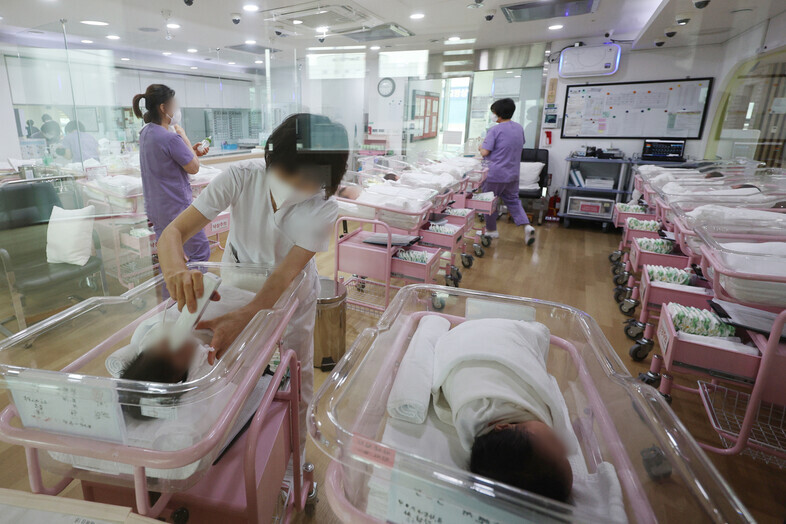hankyoreh
Links to other country sites 다른 나라 사이트 링크
Korea sees more deaths than births for 52nd consecutive month in February

The number of live births in Korea fell below 20,000 in February, a record low for the month.
According to a report on population trends for February published by Statistics Korea on Wednesday, there were 19,362 live births that month, representing a 3.3% decrease from February of last year. That was the fewest live births in the month of February since the Korean government began tracking the figure in 1981, as well as the first time the February live births figure has dropped below 20,000.
The provisional figure for live births in February 2023 (published that April) had also clocked in below 20,000 (19,939), but the official figure was later revised to 20,020.
On a monthly basis, Korea has reported fewer than 20,000 live births in April through December 2023 and June, November and December 2022.
In regional terms, births increased in five cities and provinces (Seoul, Incheon, North Jeolla Province, South Jeolla Province and Jeju Island) and fell in the other 12, including Gyeonggi Province and Busan.
The monthly live births figure has posted a year-over-year decrease for 17 months in a row, since October 2022. The month with the fewest births so far was December 2023, when there were just 16,253. At this rate, Korea is set to report its lowest number of live births ever this year, replacing last year’s record low of 229,970 births.
There were 29,977 deaths in February, up 9.6% from last year. As a result, Korea’s population in February underwent a natural decline of 10,614 people.
Natural population decline occurs when deaths outnumber births. That has been the case in Korea for 52 months now, since November 2019.
By Ahn Tae-ho, staff reporter
Please direct questions or comments to [english@hani.co.kr]

Editorial・opinion
![[Column] Life on our Trisolaris [Column] Life on our Trisolaris](https://flexible.img.hani.co.kr/flexible/normal/500/300/imgdb/original/2024/0505/4817148682278544.jpg) [Column] Life on our Trisolaris
[Column] Life on our Trisolaris![[Editorial] Penalties for airing allegations against Korea’s first lady endanger free press [Editorial] Penalties for airing allegations against Korea’s first lady endanger free press](https://flexible.img.hani.co.kr/flexible/normal/500/300/imgdb/original/2024/0502/1817146398095106.jpg) [Editorial] Penalties for airing allegations against Korea’s first lady endanger free press
[Editorial] Penalties for airing allegations against Korea’s first lady endanger free press- [Editorial] Yoon must halt procurement of SM-3 interceptor missiles
- [Guest essay] Maybe Korea’s rapid population decline is an opportunity, not a crisis
- [Column] Can Yoon steer diplomacy with Russia, China back on track?
- [Column] Season 2 of special prosecutor probe may be coming to Korea soon
- [Column] Park Geun-hye déjà vu in Yoon Suk-yeol
- [Editorial] New weight of N. Korea’s nuclear threats makes dialogue all the more urgent
- [Guest essay] The real reason Korea’s new right wants to dub Rhee a founding father
- [Column] ‘Choson’: Is it time we start referring to N. Korea in its own terms?
Most viewed articles
- 1New sex-ed guidelines forbid teaching about homosexuality
- 2OECD upgrades Korea’s growth forecast from 2.2% to 2.6%
- 360% of young Koreans see no need to have kids after marriage
- 4[Column] Life on our Trisolaris
- 5Months and months of overdue wages are pushing migrant workers in Korea into debt
- 6Korean government’s compromise plan for medical reform swiftly rejected by doctors
- 7[Guest essay] Maybe Korea’s rapid population decline is an opportunity, not a crisis
- 8S. Korea discusses participation in defense development with AUKUS alliance
- 9Presidential office warns of veto in response to opposition passing special counsel probe act
- 10Inside the law for a special counsel probe over a Korean Marine’s death